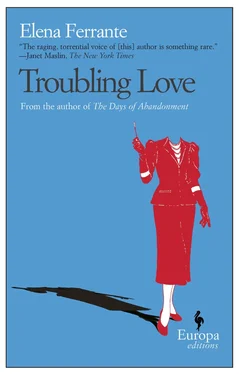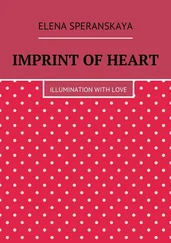On the other hand I wasn’t really depressed. I felt, rather, as if I had left myself somewhere and was no longer able to find myself: I was worn out, that is, by movements that were too quick and barely coordinated, by the urgency of one who is searching everywhere and has no time to waste. I thought that a cup of chamomile would do me good and I pushed Uncle Filippo into the first bar we came to in Via Scarlatti, while he began to talk about his wife, who was always sad: stern, hard-working, careful, methodical, but sad. But the close space of the bar had the effect of a cotton ball in my mouth. The intense smell of coffee and the loud voices of the customers and barmen drove me back toward the door, while my uncle was already shouting, with his hand in the inside pocket of his jacket, “I’ll pay!” I sat down at a table on the sidewalk, amid the squeal of brakes, an odor of imminent rain and of gas, overcrowded buses moving at a walk, people hurrying by and bumping against the table. “I’ll pay,” Uncle Filippo repeated in a lower voice, even though we hadn’t ordered and I doubted that a waiter would ever appear. Then he settled onto the chair and began to praise himself. “I have always been the energetic type. No money? No money. No arm? No arm. No women? No women. What’s essential is the mouth and the legs: to speak when you want and to go where you want. Am I right or not?”
“Yes.”
“Your mother is like that, too. We are a family that doesn’t get discouraged. When she was little, she was constantly bruising herself but she never cried: our mother had taught us to blow on the hurt and say: it will pass. Even when she was working and pricked herself with a needle, she kept this habit of saying: it will pass. Once, the sewing-machine needle pierced the nail of her index finger, came out the other side, went up and in again, three or four times. Well, she stopped the pedal, then started it up, but just enough so she could get the needle out, bandaged the finger, and went back to work. I never saw her sad.”
That was all I heard. It seemed to me that I was sinking up to my neck into the window behind me. Even the red wall of the UPIM store across the street seemed freshly coated, the paint still wet. I let the sounds of Via Scarlatti get louder, until they covered his voice. I saw his lips moving, in profile, soundless; they seemed made of rubber, manipulated by two fingers inside. He was seventy and had no reason to be satisfied with himself, but he tried to be, and perhaps he really was when he started off on that ceaseless chatter which was rapidly produced by the almost imperceptible movements of his lips. For a moment I thought with horror of males and females as living organisms, and I imagined the work of a burin polishing us like ivory, reducing us until we were without holes and without excrescences, all identical and without identity, with no play of somatic features, no weighting of small differences.
My mother’s wounded finger, pierced by the needle before she was ten, was more familiar to me than my own fingers precisely because of that detail. It was purple, and the nail appeared to sink into the crescent. For a long time I’d wanted to lick it and suck it, more than her nipples. Maybe she had even let me when I was still very small. On the pad of the finger there was a white scar: the wound had become infected, it had had to be lanced. Around it I could smell the odor of her old Singer, which had the shape of an elegant animal, half dog half cat, and the odor of the cracked leather cord that transmitted the action of the pedal from the big wheel to the small one, the needle that went up and down from the animal’s muzzle, the thread that ran through its nostrils and ears, the spool that rotated on the pivot fixed to its back. I could smell the oil that was used to grease it, the black paste of oil mixed with dust that I scratched away with a nail and secretly ate. I intended to make a hole in my finger, too, to make her see that it was risky to deny me what I didn’t have.
There were too many stories of the infinite, minuscule differences that made her unreachable, and all together turned her into a being desired in the external world at least as much as I desired her. There had been a time when I imagined biting off that distinctive finger, because I couldn’t find the courage to offer mine to the mouth of the Singer. Anything in her that had not been conceded to me I wanted to eliminate from her body. Thus nothing more would be lost or dispersed far from me, because finally everything had been lost already.
Now that she was dead, someone had scraped away her hair and had disfigured her face to fit my body. It had happened after years in which, out of hatred, out of fear, I had wanted to eliminate every root I had in her, even the deepest: her gestures, the inflections of her voice, her way of taking a glass or drinking from a cup, her method of putting on a skirt, as if it were a dress, the arrangement of the objects in her kitchen, in her drawers, how she did her most intimate washing, her taste in food, her dislikes, her enthusiasms, and the language, the city, the rhythms of her breath. All of it remade, so that I could become me and detach myself from her.
On the other hand I hadn’t wanted or been able to root anyone in me. Soon I would lose even the possibility of having children. No human being would ever detach itself from me with the anguish with which I had detached myself from her, only because I had never been able to attach myself to her definitively. There would not be anyone more or less between me and another aspect of myself. I would remain me until the end, unhappy, discontent with what I had furtively taken from the body of Amalia. Little, too little, the booty I had managed to seize, tearing it from her blood, her belly, and the measure of her breath, to hide in my body, in the capricious matter of the brain. Insufficient. What an ingenuous and careless sort of makeup, to try to call “I” this forced flight from a woman’s body, although I had carried away from it less than nothing! I was no I. And I was confused: I didn’t know if what I had been discovering and telling myself, ever since she ceased to exist and couldn’t refute it, horrified me or gave me pleasure.
Maybe I came to because of the rain on my face. Or because Uncle Filippo, standing beside me, shook me by the arm with the only hand he had. The fact is that I felt a kind of electric shock and realized that I had fallen asleep.
“It’s raining,” I mumbled while my uncle continued to tug at me furiously. He was shrieking as if beside himself, but I couldn’t understand what he was saying. I felt weak and frightened, I couldn’t get up. People were rushing around, looking for shelter. Men shouted or laughed loudly and, running, bumped dangerously into the little table. I was afraid that they would knock me over. One sent the chair that had just been occupied by Uncle Filippo flying. “Nice weather,” he said, and went into the bar.
I tried to stand, thinking that my uncle wanted to pull me up. Instead he let go of my arm, stumbled through the crowd, and started yelling astonishing insults from the edge of the sidewalk, pointing with his outstretched arm to the other side of the street, beyond the cars and the packed buses with the rain drumming on their roofs.
I got up, carrying the bag and the purse. I wanted to see whom he was getting mad at, but the traffic created a compact wall of steel plates, and the rain was coming down harder and harder. So I crept along the wall of the building to avoid getting soaked and meanwhile found a gap between the stopped cars and buses. Through it I saw Caserta against the red patch of the UPIM. He was bent almost double, but walking quickly, and looking back continuously as if afraid of being followed. He bumped into passersby but did not seem to realize it, nor did he slow down: leaning forward, his arms swinging, at every collision he pirouetted on himself without stopping, as if he were a silhouette attached to a fulcrum that, by means of a secret mechanism, was rolling rapidly along the pavement. From a distance it seemed that he was singing and dancing but perhaps he was only cursing, gesticulating.
Читать дальше












